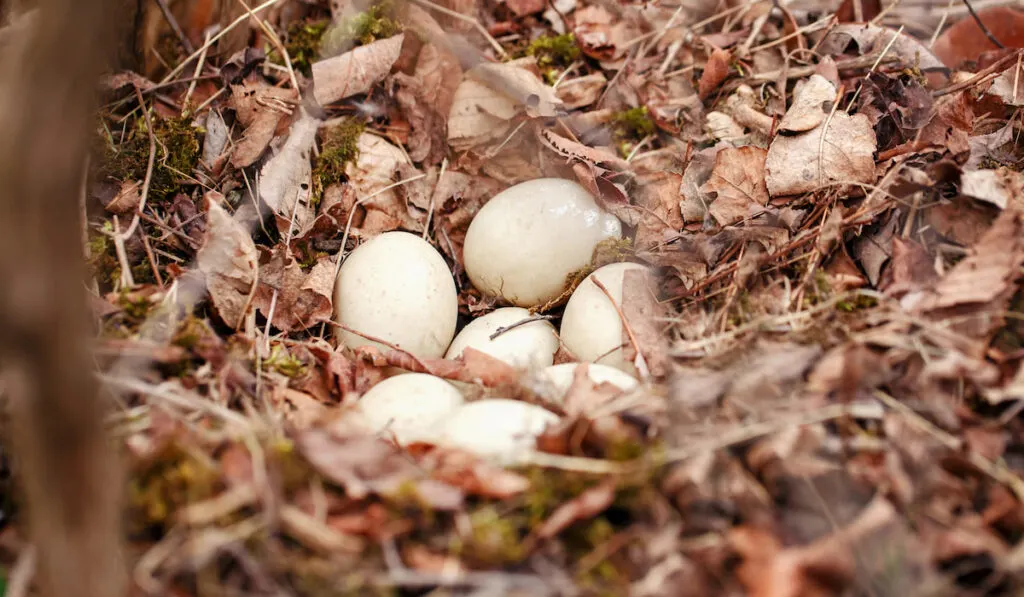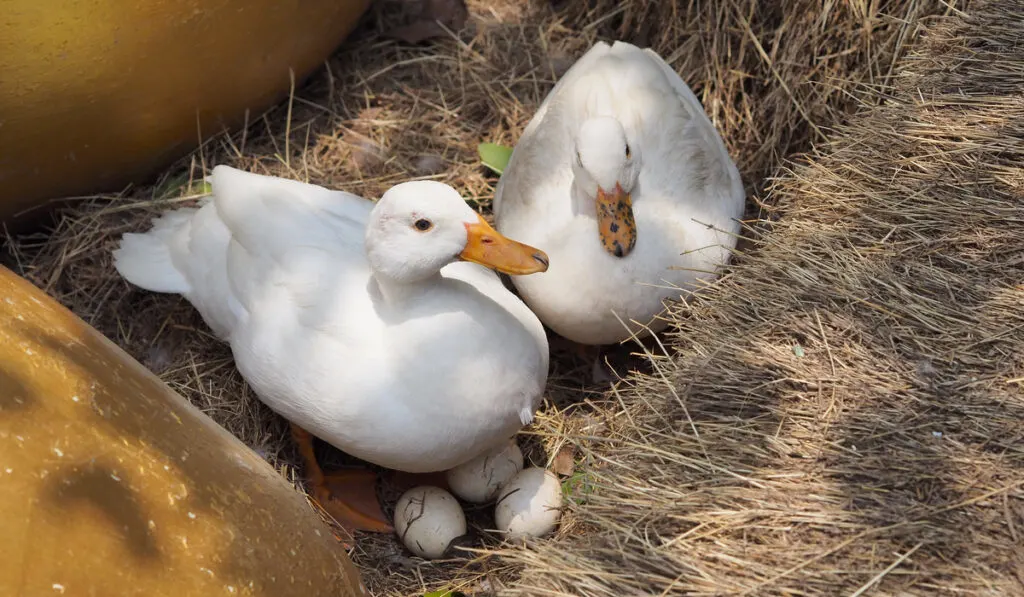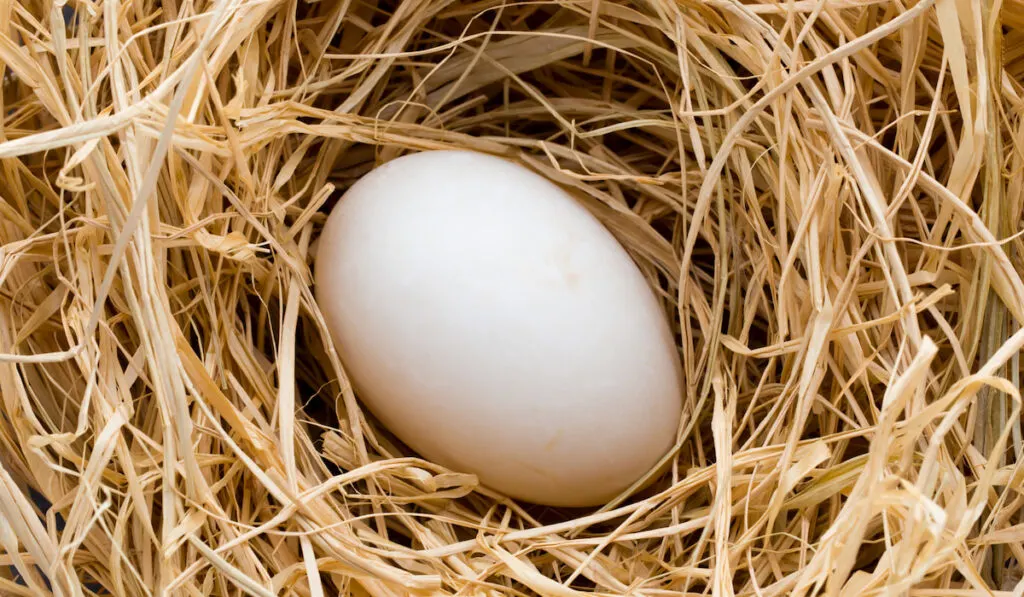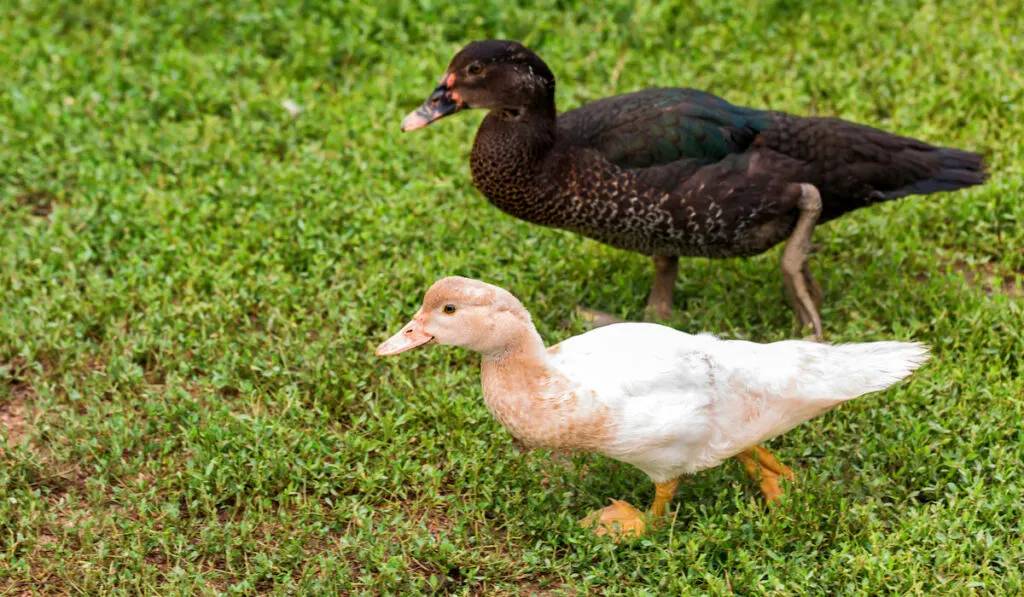Table of Contents
Nest Spots for Ducks
Ducks are very intelligent birds, and often carefully choose their nesting spots with regard and concern to other factors like the security of their desired nesting spots.
If you find a duck’s nest in a position that seems unsafe to you, it is perfectly fine with the duck, and you should not tamper with their choice of nesting position.
In the wild, ducks often make their nests in dry spots near water bodies like lakes or dams but are well covered with vegetation, or they may opt for a natural hole in a tree.

They often exploit open water where food is in abundance. In urban settlements, however, this can be a problem because the town ponds that have an adequate and reliable food supply for ducks often attract too many ducks for the pond to accommodate.
Due to this situation, in desperation of avoiding competition and harassment by others, the ducks may end up settling for less than perfect nest positions like woodpiles, haystacks, boathouses, roof gardens, and even in flowerpots on balconies that may be several floors up.
Do Ducks Move Their Eggs?
Ducks can move their eggs, but only in rare instances when it becomes necessary for the survival of the eggs. The likelihood of a duck moving its eggs is very low, and if they all disappear at once, there is a higher chance that a predator got to them first.
A duck will move its eggs if it senses impending danger, such as predators, or an extreme change in environment, then it may take the initiative to protect its unborn ducklings by moving the eggs.
They move the eggs by rolling them out of the nests or carefully clutching them in their beaks and then delivering them to their desired safe spots.

Why Would Duck Eggs Suddenly Disappear?
It is often a frustrating experience to note that your duck’s eggs have disappeared. At times, they may disappear one by one, and at other times disappear all at once.
In some cases, it is possible that the mother duck moved them out of her nest, or may have been stolen by other ducks. Additionally, they may have been stolen by predators like mustelids, snakes, raccoons, and even humans.
Ducks often roll bad/rotten eggs out of the nest to avoid letting them burst inside the nest. You should be able to see them close to the nest or in the water, where it is floating or may have sunk. In the case of another duck stealing the eggs, you should be able to find them in another nest.
Ducks may at times accidentally crack an egg open, and end up eating it. Rarely, they may develop a taste for it and may start eating their own eggs in their entirety, including the calcium-rich shells, explaining the missing shells. If in doubt whether they have eaten their own eggs, check for yolk on their bills.
Depending on the position of the duck’s nest, several predators might infiltrate and either eat the eggs on the spot or carry them off for later consumption. Raccoons and snakes are able to swallow entire eggs and run off without leaving any evidence. Raccoons can clear out an entire nest within a short time.
Rats and mustelids like ferrets and minks do not often run off with the eggs but will eat them on the spot, and will leave the broken shells around. This is also applicable for some little birds, but larger ones like crows, magpies, and corvids are able to organize a heist and may make off with several eggs within a short time.
Foxes, on the other hand, may eat the eggs on the spot or run off with them for later consumption. In most cases, however, they not only run off with eggs but also attack the ducks as well unless the duck is out of the nest when it visits.
To some extent, humans are also responsible for missing duck eggs because sadly, some people fail to respect the animals’ boundaries and what belongs to them. This is rare as compared to the other predator attacks.

Do Ducks Bury Their Eggs?
Egg-burying is a routine for ducks. They do this for safety and protection against predators like bugs, insects, and larger ones like raccoons, who target the eggs and gulp them down their throats within minutes.
A duck will bury its eggs as soon as it lays the first one, and will subsequently lay others on top, making an egg cluster for a bigger hatch, probably at the same time. Additionally, burying eggs helps the ducks keep the eggs at their optimum temperature.
Ducks also cover their nests with anything they can find including vegetation, straw, and even their own feathers.
They are known to pluck their own belly feathers to insulate their eggs. Additionally, the bare belly area from which feathers are plucked provides a direct heat source for the eggs. Using vegetation and straw to cover the nest provides extra security since it serves as a camouflage boundary.
Do Ducks Lay Eggs Under Water?
Ducks can lay eggs in water, but only in rare instances. As afore-mentioned, ducks usually nest on a patch of dry land near water, most preferably a position with some vegetation cover that helps camouflage and hide the nest.
She may, however, choose to lay her eggs underwater for various reasons, including if the nest was raided before, and she is now nervous and concerned about the safety of her new egg, which is guaranteed underwater.
The major concern, however, is if the eggs laid in water will hatch. Duck eggs technically need warmth around them for them to hatch. With regard to this fact, water is cold, and eggs left there cannot be expected to hatch, making burying a better option.
Depending on the duration the egg spends in the water, its viability is also altered. They may start doing well if you take them out in time and provide the right temperature but it might be too late if it stays in the water for too long.
Can You Move a Duck Nest With Eggs?
If you stumble upon a duck nest, do not handle it, move it, or interfere with it in any way. What looks like a bad spot for a duck’s nest to you may not be a bad spot for the duck, and interfering with it doesn’t do any good. Once moved, a duck will not recognize its nest, even if it is only moved a short distance. The duck will abandon that nest.
You should also be cautious not to disrupt the duck while it sits on the eggs, especially during incubation. Too many disruptions can cause the duck to abandon the nest, especially if it is forced to leave the nest for extended periods of time.
In this case, the duck may not be able to provide the required incubation temperature for the eggs, making the mission a failure, and the duck will eventually abandon the nest.
If it is necessary to move the nest, ducks are federally protected and it is, therefore, good to engage a qualified game department officer who will acquire the required permit for moving the nest.

Tips for Keeping Predators Away From Duck Nests
There are times when ducks, both the wild and domestic, lay eggs in your backyard. The least you can do is to help protect the eggs and the mother duck from predators to give them ample incubation space and time for them to hatch.
Let’s look at how you can give the mother duck and her eggs the comfort and security they need.
- Place a pen around the duck’s nest to keep the predators, including cats and dogs away.
- Place plant containers with flowers or bushes around the nesting duck for a sense of safety and protection to the duck.
- Allow your lawn to grow long around the nesting duck for more camouflage and security and do not mow your lawn while the duck is nesting, to avoid scaring it away.
- In case you suspect that a snake might be stealing duck eggs, a minnow trap with eggs as bait will do.
- If a nest is in a vulnerable position like a sidewalk, tape off the area or put up signs to alert people about the nest.
- Do not feed the duck. They do not need food while incubating their eggs, and leaving food like bread might end up attracting predators.
Conclusion
Ducks are intelligent birds and know how to protect and take care of their eggs, and the best thing you can do to help is provide it the comfort and security it needs when laying and incubating eggs, thereby not giving it a reason to move its eggs.
Ducks can only eat broken eggs, and this should not be an issue of concern. You should, however, give her the right food with the correct nutritional value while it lays eggs to avoid instances of hungry ducks cracking and eating their eggs.
Resources
- https://www.rspb.org.uk/birds-and-wildlife/advice/how-you-can-help-birds/where-do-ducks-nest/
- https://hayfarmguy.com/do-ducks-bury-their-eggs/
- https://untamedanimals.com/do-ducks-lay-eggs-in-the-water/
- https://homesteady.com/how-8256591-attract-blackbirds-backyard.html
- https://www.reconnectwithnature.org/news-events/the-buzz/do-not-interfere-with-duck-nests
- https://www.wildlifecenter.org/mallard-duck-nests
- https://poultryparade.com/why-your-duck-eggs-are-disappearing-and-what-you-can-do/
